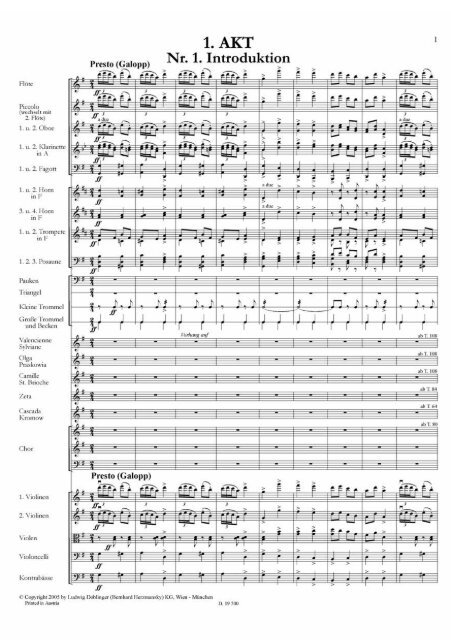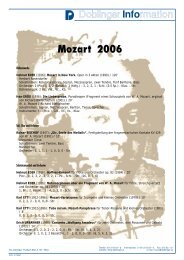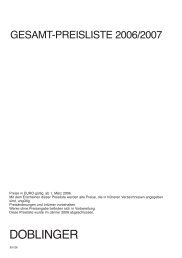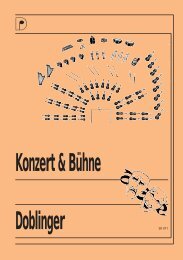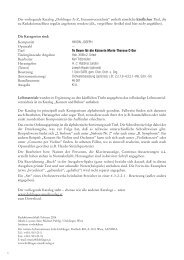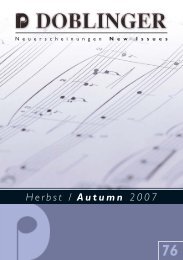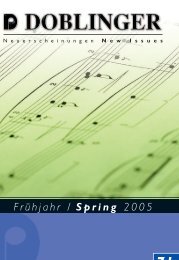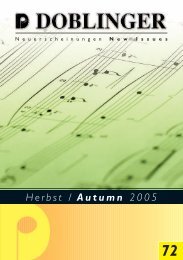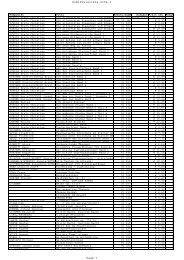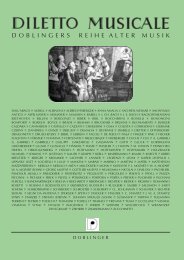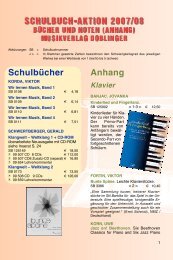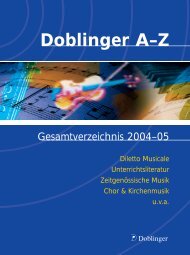Die lustige Witwe The Merry Widow - Willkommen bei Doblinger ...
Die lustige Witwe The Merry Widow - Willkommen bei Doblinger ...
Die lustige Witwe The Merry Widow - Willkommen bei Doblinger ...
Create successful ePaper yourself
Turn your PDF publications into a flip-book with our unique Google optimized e-Paper software.
DIE LUSTIGE WITWE 1905–2005:<br />
<strong>Die</strong> definitive Fassung. Erstmals als Partitur!<br />
Brand-new, restored to its original splendour!<br />
Erhältlich von:<br />
Available from:<br />
ca. 400 Seiten, Leinenband mit Goldprägung<br />
approx. 400 pages, cloth-binding, gold blocking<br />
Format: 24,5 x 33,5 cm<br />
<strong>Doblinger</strong> Best.Nr. / Order-No.: D-1905-100<br />
ISBN 3-900695-80-6<br />
ISMN M-012-19500-9
<strong>Die</strong> <strong>lustige</strong> <strong>Witwe</strong><br />
<strong>The</strong> <strong>Merry</strong> <strong>Widow</strong><br />
<strong>Die</strong> definitive Fassung.<br />
Minuziös rekonstruiert.<br />
<strong>Die</strong> definitive Fassung.<br />
Erstmals als Partitur.<br />
<strong>The</strong> definitive version.<br />
Meticulously reconstructed.<br />
<strong>The</strong> definitive version.<br />
For the first time as a score.
Lippen schweigen, ’s flüstern Geigen: 100 Jahr’!<br />
<strong>Die</strong> <strong>lustige</strong> <strong>Witwe</strong> 1905–2005<br />
Der größte und anhaltendste Erfolg der Operettengeschichte im 20. Jahrhundert –<br />
zum Jubiläum endlich in gewissenhaft restaurierter Originalfassung!<br />
Als Bernhard Herzmansky einst seine Brieftasche zückte, einem jungen, viel versprechenden<br />
Komponisten mit einem Vorschuss aus der Patsche half und sich damit dessen<br />
nächste Operette für seinen Verlag sicherte, hätte sich wohl auch er die Intensität des<br />
Triumphzuges von Franz Lehárs „Lustiger <strong>Witwe</strong>“ nicht träumen lassen.<br />
Ihre Premiere am 30. Dezember 1905 im <strong>The</strong>ater an der Wien unter Lehárs eigener Leitung<br />
läutete nicht weniger als eine neue Ära des Genres ein, in der das Werk innerhalb<br />
kürzester Zeit schwindelerregende Aufführungsrekorde errang – und der Erfolg ist ihm bis<br />
heute treu geblieben. Als „<strong>Merry</strong> <strong>Widow</strong>“, „Veuve joyeuse“,<br />
„Viuda alegra“, „Vrolijke weeuwtje“, „Vedova allegra“,<br />
„Glada Änkan“ (um nur einige zu nennen!) hat Hanna Glawari<br />
aus dem fiktiven Balkanstaat Pontevedro längst auch alle<br />
Welt bereist und verzaubert.<br />
Doch 100 Jahre in aller Munde zu sein,<br />
hat hartnäckige Spuren hinterlassen.<br />
Lang schon eingebürgerte, aber willkürliche Veränderungen<br />
an der Musik und am Libretto sind mittlerweile nur mehr<br />
durch akribisches Quellenstudium identifizierbar: zahlreiche<br />
Abweichungen in Phrasierung, Dynamik, falschen Tönen,<br />
Instrumentierung, Strichen, Einfügungen etc.<br />
<strong>The</strong>aterzettel der Uraufführung<br />
(Archiv <strong>Doblinger</strong>)<br />
<strong>Die</strong> definitive Fassung.<br />
Minuziös rekonstruiert.<br />
Im Sinne aktuellen Strebens nach musikalischer Authentizität und Werktreue nimmt der<br />
Musikverlag <strong>Doblinger</strong> seine Verantwortung als Originalverleger wahr, die Partitur der<br />
„Lustigen <strong>Witwe</strong>“ einer gründlichen Revision zu unterziehen, damit diese einmalige Operette<br />
zum Jubiläum wieder genau so aufgeführt werden kann, wie es sich der Komponist<br />
vor hundert Jahren vorgestellt hat. <strong>Die</strong>se historisch-kritische Neuausgabe nimmt Norbert<br />
Rubey vor, der sich nicht zuletzt als Editionsleiter von <strong>Doblinger</strong>s Johann Strauss Gesamtausgabe<br />
international einen exzellenten Ruf als Experte für populäre Kunstmusik Wiener<br />
Provenienz erwerben konnte.
Als wichtigste Quellen der Neuausgabe dienen:<br />
• die autographe Partitur des Komponisten im Lehár-Museum in Bad Ischl,<br />
• die von Rudolf Bauer im Jahr 1907 kopierte Partitur, die einer Revision Lehárs unterzogen<br />
worden war, im Verlag <strong>Doblinger</strong>,<br />
• der autographe Klavierauszug des Komponisten im Lehár-Schlössel in Wien,<br />
• der Klavierauszug mit Text, erschienen <strong>bei</strong> <strong>Doblinger</strong>, aus dem Besitz des Librettisten<br />
Viktor Léon, in der Wiener Stadt- und Landesbibliothek.<br />
Bauers Abschrift der Partitur aus dem Jahr 1907 mit dem Duett<br />
„Lippen schweigen“ (Hanna, Danilo) überliefert jene Fassung, die<br />
Lehár wohl als verbindlich und endgültig betrachtete.<br />
Im Anhang: frühere Versionen<br />
Getreu dem umfassenden editorischen Anspruch der Neuausgabe<br />
enthält der ausführliche Anhang auch frühere Fassungen, wie zum<br />
Beispiel „Camilles Reminiszenz und Lied – Sie ist eine anständige<br />
Frau“ (ursprünglich Nummer 5).<br />
Gleichzeitig wird auch das komplette Aufführungsmaterial neu<br />
erstellt und herausgebracht!<br />
Operetten-üblicher Aufführungspraxis folgend, hatten die Kapellmeister<br />
am Pult traditionellerweise mit einer Direktionsstimme ihr<br />
Auslangen zu finden.<br />
Mizzi Günther (Hanna) und Louis<br />
Treumann (Danilo), die Interpreten der Doch „<strong>Die</strong> <strong>lustige</strong> <strong>Witwe</strong>“ verdient nicht nur, sondern verlangt<br />
Uraufführung (Archiv <strong>Doblinger</strong>) aufgrund ihrer komplexen musikalischen Faktur ganz einfach<br />
eine umfassende Darstellung –<br />
wie sie gewissenhafte Interpreten bereits seit langem<br />
ersehnen.<br />
In einer einmaligen Sonderauflage wird deshalb im<br />
Rahmen der historisch-kritischen Neuausgabe zum<br />
100. Geburtstag von Lehárs Operetten-Dauerhit nun<br />
erstmals die Dirigierpartitur der „Lustigen <strong>Witwe</strong>“ käuflich<br />
erhältlich sein – als unerlässliches Handwerkszeug<br />
für Dirigenten und Interpreten, als Studienobjekt für<br />
Musikliebhaber und Wissenschafter.<br />
Der repräsentativ gestaltete Band genügt aufgrund<br />
seiner editorischen Doppelfunktion sowohl den<br />
Anforderungen der Praxis wie auch der Forschung.<br />
<strong>Die</strong> definitive Fassung.
Lippen schweigen, ’s flüstern Geigen:<br />
a hundred years of silent lips and whispering violins!<br />
<strong>The</strong> <strong>Merry</strong> <strong>Widow</strong> 1905–2005<br />
<strong>The</strong> biggest and most enduring success story in the history of twentiethcentury<br />
operetta – now appearing in a carefully restored original version for<br />
the jubilee year!<br />
On the day when Bernhard Herzmanksy reached for his wallet<br />
to help an impecunious but promising young composer<br />
with an advance for his next operetta – thus also securing the work<br />
for his own publishing house – even his wildest dreams could not<br />
have foreseen the triumphs Franz Lehár’s ‘<strong>The</strong> <strong>Merry</strong> <strong>Widow</strong>‘ was<br />
to enjoy in the years to come.<br />
<strong>The</strong> premiere under the baton of the composer at the <strong>The</strong>ater an<br />
der Wien on December 30, 1905, ushered in nothing less than a<br />
new era in the history of operetta. Within a very short time, the<br />
work had been accorded a record-breaking number of performances,<br />
and this vertiginous success has not abated to this day.<br />
Whether as '<strong>Merry</strong> <strong>Widow</strong>', 'Veuve Joyeuse', 'Viuda Alegra', 'Vrolijke<br />
Weeuwtje', 'Vedova Allegra', or 'Glada Änkan' (to name only<br />
a few of her appellations), Hanna Glawari from the fictitious Balkan<br />
state Pontevedro has long since travelled the whole wide<br />
world, enchanting all and sundry on her way.<br />
Louis Treumann, der erste Danilo<br />
(Archiv <strong>Doblinger</strong>)<br />
One hundred years of <strong>bei</strong>ng a name upon everyone's lips,<br />
however, cannot but lead to a certain degree of disfiguration.<br />
Only meticulous study of the sources enables us to identify the<br />
numerous gratuitous amendments made to the music and<br />
libretto, all now common practice in performance: changes<br />
in phrasing, dynamics, instrumentation, and bowing, not to<br />
mention wrong notes, insertions, and so on.<br />
<strong>The</strong> definitive version.<br />
Meticulously reconstructed.<br />
Erstmals als Partitur.<br />
Fully aware of the original publisher’s responsibility for<br />
musical authenticity, <strong>Doblinger</strong> has subjected the score<br />
to thorough revision, so that this unique operetta can be<br />
performed in its jubilee year as the composer intended<br />
it to be performed a century ago.
<strong>The</strong> historical-critical new edition is <strong>bei</strong>ng drawn up by Norbert Rubey, a scholar wellknown<br />
for his expertise in the field of popular Viennese art-music, not least as Director of<br />
the <strong>Doblinger</strong> Johann Strauss Complete Edition.<br />
<strong>The</strong> most important sources for the new edition are:<br />
• the composer's autograph score held by the Lehár Museum in Bad Ischl;<br />
• Lehár’s revised version, in the copy made by Rudolf Bauer in 1907, held by <strong>Doblinger</strong><br />
Music Publishers;<br />
• the composer’s autograph piano score, held at the Lehár-Schlössel in Vienna;<br />
• the librettist Viktor Léon’s own piano score with text, published by <strong>Doblinger</strong>, held by<br />
the Wiener Stadt- und Landesbibliothek.<br />
Bauer’s 1907 transcription of the score with Hanna and Danilo’s duet ‘Lippen schweigen’<br />
is certainly the version that Lehár regarded as definitive and binding.<br />
In the Appendix: earlier versions<br />
In accord with the comprehensive character of the new edition, a detailed appendix features<br />
also earlier editions as the ‘Camilles Reminiszenz und Lied – Sie ist eine anständige<br />
Frau’ (originally number 5).<br />
At the same time the performance materials are <strong>bei</strong>ng newly produced.<br />
<strong>The</strong> definitive version.<br />
For the first time as a score.<br />
Conventional performance practice in operetta traditionally<br />
dictated that the conductor had to be content with a particell,<br />
i.e. a compressed or piano score. A work as musically<br />
complex as ‘<strong>The</strong> <strong>Merry</strong> <strong>Widow</strong>’, however, not only deserves<br />
but demands a full score revealing all its qualities and<br />
facets.<br />
For this reason, the publication of the Lehár 100th anniversary<br />
historical-critical edition will include a once-only<br />
special printing of the conductor’s score of ‘<strong>The</strong> <strong>Merry</strong><br />
<strong>Widow</strong>’, offered for sale for the first time ever. Handsomely<br />
produced, this volume will be equally suitable as an indispensable<br />
text for conductors, singers, and instrumentalists,<br />
or as an irreplacable scholarly reference work for musicologists<br />
and music-lovers.<br />
<strong>Die</strong> <strong>Witwe</strong> am Originalschauplatz in<br />
Paris (Archiv <strong>Doblinger</strong>)


